
The Internet's Premier Classical Music Source
Related Links
- J.S. Bach Reviews
- Latest Reviews
- More Reviews
-
By Composer
-
Collections
DVD & Blu-ray
Books
Concert Reviews
Articles/Interviews
Software
Audio
Search Amazon
Recommended Links
Site News
 CD Review
CD Review
Johann Sebastian Bach
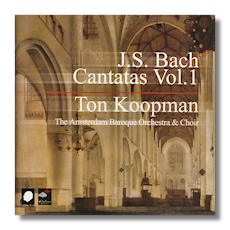
Cantatas Volumes I-X
Cantatas Volume I
- Christ lag in Todesbanden, BWV 4
- Ich hatte viel Bekümmernis, BWV 21
- Der Himmel lacht! die Erde jubilieret, BWV 31
- Gott ist mein König, BWV 71
- Gottes Zeit ist die allerbeste, BWV 106 "Actus tragicus"
- Aus der Tiefen rufe ich, Herr, zu dir, BWV 131
- Nach dir, Herr, verlanget mich, BWV 150
- Barmherziges Herze der ewigen Liebe, BWV 185
- Der Herr denket an uns, BWV 196
- Ich hatte viel Bekümmernis, BWV 21: #9a, Sei nun wieder zufrieden, meine Seele
- Christ lag in Todesbanden, BWV 4: #1, Sinfonia in E minor
- Christ lag in Todesbanden, BWV 4: #2, Christ lag in Todesbanden
- Christ lag in Todesbanden, BWV 4: #8, Wir essen und leben wohl
- Christ lag in Todesbanden, BWV 4: #3, Den Tod niemand zwingen kunnt
Barbara Schlick, soprano
Kai Wessel, alto
Guy de Mey, tenor
Klaus Mertens, bass
Amsterdam Baroque Choir
Amsterdam Baroque Orchestra/Ton Koopman
Challenge 72201
Cantatas Volume 2
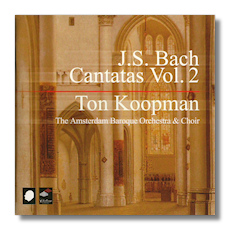
- Weinen, Klagen, Sorgen, Zagen, BWV 12
- Gleich wie der Regen und Schnee vom Himmel fällt, BWV 18
- Nun komm, der Heiden Heiland, BWV 61
- Bereitet die Wege, bereitet die Bahn!, BWV 132
- Tritt auf die Glaubensbahn, BWV 152
- Erschallet, ihr Lieder, erklinget ihr Saiten!, BWV 172
- Himmelsknig sei willkommen, BWV 182
- Mein Herze schwimmt im Blut, BWV 199
- Amore traditore, BWV 203
- Quodlibet, BWV 524 [fragment]
- Gleich wie der Regen und Schnee vom Himmel fällt, BWV 18: #1, Sinfonia in A minor
- Gleich wie der Regen und Schnee, BWV 18: Ich bitt, O Herr, aus Herzensgrund
- Himmelsknig sei willkommen, BWV 182: Sinfonia in G Major
- Himmelsknig sei willkommen, BWV 182: #7, Jesu, deine Passion
Barbara Schlick, soprano
Kai Wessel, alto
Christoph Prégardien, tenor
Klaus Mertens, bass
Amsterdam Baroque Choir
Amsterdam Baroque Orchestra/Ton Koopman
Challenge 72202
Cantatas Volume 3
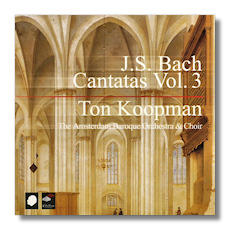
- Christen, ätzet diesen Tag, BWV 63
- Ach, ich sehe, itzt, da ich zu Hochzeit gehe, BWV 162
- Mein Gott, wie lang, ach lange, BWV 155
- Christen, ätzet diesen Tag, BWV 63: #1, Christen, ätzet diesen Tag
- Ach, ich sehe, itzt, BWV 162: Ach, ich sehe, itzt
- Ach, ich sehe, itzt, BWV 162: Ach, ich habe schon erblicket
- Jesus nahm zu sich die Zwölfe, BWV 22
- Du wahrer Gott und Davids Sohn, BWV 23
- Nur jedem das Seine, BWV 163
- O heiliges Geist- und Wasserbad, das Gottes Reich uns einverliebet, BWV 165
- Widerstehe doch der Sünde, BWV 54
- Komm, du süsse Todesstunde, BWV 161
- Was mir behagt, ist nur die muntre Jagd!, BWV 208 "Hunt Cantata"
Els Bongers, soprano
Ruth Holton, soprano
Barbara Schlick, soprano
Caroline Stam, soprano
Andreas Scholl, countertenor
Elizabeth Magnus-Harnoncourt, alto
Paul Agnew, tenor
Klaus Mertens, bass
Amsterdam Baroque Choir
Amsterdam Baroque Orchestra/Ton Koopman
Challenge 72203
Cantatas Volume 4
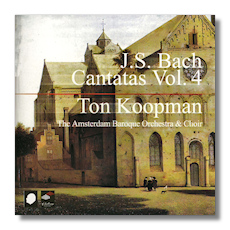
- Lass, Fürstin, lass noch einen Strahl, BWV 198
- Preise dein Glücke, gesegnetes Sachsen, BWV 215
- Schweigt stille, plaudert nicht, BWV 211 "Coffee Cantata"
- Tönet, ihr Pauken! Erschallet Trompeten!, BWV 214
- Non sa che sia dolore, BWV 209
- Ich bin in mir vergnügt, BWV 204
- Der Streit zwischen Phoebus und Pan, BWV 201
Els Bongers, soprano
Anne Grimm, soprano
Lisa Larsson, soprano
Caroline Stam, soprano
Elizabeth Magnus-Harnoncourt, alto
Peter de Groot, countertenor
Paul Agnew, tenor
Jeremy Ovenden, tenor
Klaus Mertens, bass
Donald Bentvelsen, bass
Amsterdam Baroque Choir
Amsterdam Baroque Orchestra/Ton Koopman
Challenge 72204
Cantatas Volume 5
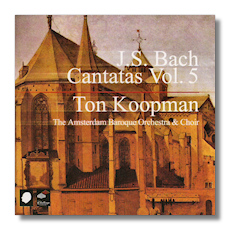
- Weichet nur, betrübte Schatten, BWV 202 "Wedding Cantata"
- Der zufriedengestellte äolus, BWV 205
- Schleicht spielende Wellen, BWV 206
- Auf, schmetternde Töne, BWV 207a
- O holder Tag, erwünschte Zeit, BWV 210
- Mer Hahn en neue Oberkeet, BWV 212 "Peasant Cantata"
- Hercules auf dem Scheidewege, BWV 213
Anne Grimm, soprano
Lisa Larsson, soprano
Sibylla Rubens, soprano
Elizabeth Magnus-Harnoncourt, alto
Christoph Prégardien, tenor
Klaus Mertens, bass
Amsterdam Baroque Choir
Amsterdam Baroque Orchestra/Ton Koopman
Challenge 72205
Cantatas Volume 6
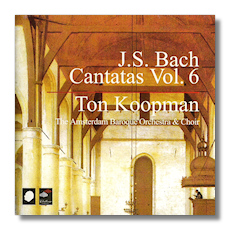
- Nun ist das Heil und die Kraft, BWV 50 [fragment]
- Wer mich liebet, der wird mein Wort halten, BWV 59
- Lobe den Herren, meine Seele; und vergiss nicht, was er dir Gutes getan, BWV 69
- Lobe den Herren, meine Seele, BWV 69a
- Die Elenden sollen essen, dass sie satt werden, BWV 75
- Die Himmel erzählen die Ehre Gottes, BWV 76
- Du Hirte Israel, höre, BWV 104
- Siehe zu, dass deine Gottesfurcht nicht Heuchelei sei, BWV 179
- ärgre dich, o Seele, nicht, BWV 186
- Singet dem Herren ein neues Lied, BWV 190
Ruth Ziesak, soprano
Elizabeth Magnus-Harnoncourt, alto
Paul Agnew, tenor
Klaus Mertens, bass
Amsterdam Baroque Choir
Amsterdam Baroque Orchestra/Ton Koopman
Challenge 72206
Cantatas Volume 7
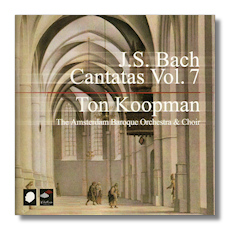
- Christus, der ist mein Leben, BWV 95
- Nimm, was dein ist, und gehe hin, BWV 144
- Halt im Gedächtnis Jesum Christ, der auferstanden ist von der Todten, BWV 67
- Ein ungefärbt Gemüte von deutscher Treu und Güte, BWV 24
- Erforsche mich, Gott, und erfahre mein Herz, prüfe mich und erfahre, wie ich's meine, BWV 136
- Erwünschtes Freudenlicht, BWV 184
- Herr, gehe nicht ins Gericht mit deinem Knecht, BWV 105
- Bringet dem Herren Ehre seines Namens, betet an den Herren in Heil'gem Schmuck, BWV 148
- Herz und Mund und Tat und Leben, BWV 147
- Leichtgesinnte Flattergeister, BWV 181
- Erhöhtes Fleisch und Blut, BWV 173
- Leichtgesinnte Flattergeister, BWV 181: #1, Leichtgesinnte
- Leichtgesinnte Flattergeister, BWV 181: #5, Lass, Höchster, uns zu allen Zeiten
Lisa Larsson, soprano
Elizabeth Magnus-Harnoncourt, alto
Bogna Bartosz, alto
Gerd Türk, tenor
Klaus Mertens, bass
Amsterdam Baroque Choir
Amsterdam Baroque Orchestra/Ton Koopman
Challenge 72207
Cantatas Volume 8
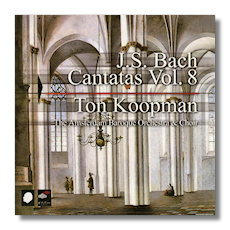
- Dazu ist erschienen der Sohn Gottes, BWV 40
- Schauet doch und sehet, ob irgend ein Schmerz sei, wie mein Schmerz, BWV 46
- O Ewigkeit, du Donnerwort, BWV 60
- Sehet, welch eine Liebe, BWV 64
- Sie werden aus Saba alle kommen, BWV 65
- Du sollst Gott, deinen Herren Lieben, BWV 77
- Jesus schläft, was soll ich hoffen?, BWV 81
- Erfreute Zeit im neuen Bunde, BWV 83
- Was soll ich aus dir machen, Ephraim, BWV 89
- Es reisset euch ein schrecklich Ende, ihr sündlichen verächter, hin, BWV 90
- Ich glaube, lieber Herr, hilf meinem Unglauben!, BWV 109
- Ihr Menschen, rühmet Gottes Liebe, BWV 167
Dorothea Röschmann, soprano
Elizabeth Magnus-Harnoncourt, alto
Bogna Bartosz, alto
Jörg Dürmüller, tenor
Klaus Mertens, bass
Amsterdam Baroque Choir
Amsterdam Baroque Orchestra/Ton Koopman
Challenge 72208
Cantatas Volume 9
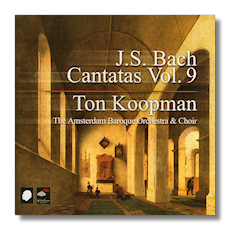
- Ich elender Mensch, wer wird mich erlösen vom Leibe dieses Todes, BWV 48
- Mein liebster Jesus ist verloren, BWV 154
- Warum betrübst du dich, mein Herz?, BWV 138
- Durchlauchtster Leopold, BWV 173a
- Wer da gläubet und getauft wird, BWV 37
- Schau, lieber Gott, wie meine Feind', BWV 153
- Wo gehest du hin?, BWV 166
- Wahrlich, wahrlich ich sage euch, BWV 86
- Wachet! Betet! Betet! Wachet!, BWV 70
- Erfreut euch, ihr Herzen, entweichet ihr Schmerzen, es lebet der Heiland, BWV 66
- Höchsterwünschtes Freudenfest, BWV 194
Lisa Larsson, soprano
Sibylla Rubens, soprano
Caroline Stam, soprano
Bernhard Landauer, countertenor
Christoph Prégardien, tenor
Klaus Mertens, bass
Amsterdam Baroque Choir
Amsterdam Baroque Orchestra/Ton Koopman
Challenge 72209
Cantatas Volume 10
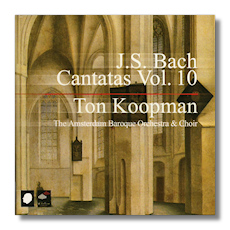
- O Ewigkeit, du Donnerwort, BWV 20
- Preise, Jerusalem, den Herren, BWV 119
- Ein Herz, das seinen Jesum lebend weiss, BWV 134
- Sie werden euch in den Bann tun, BWV 44
- Herr, wie du willt, so schicks mit mir, BWV 73
- Ach Gott, vom Himmel sieh' darein, BWV 2
- Nimm von uns, Herr, du treuer Gott, BWV 101
- Schmücke dich, o liebe Seele, lass die dunkle Sünden höhle, komm an's helle Licht gegangen, BWV 180
- Herr Gott, dich loben alle wir, BWV 130
- Die Zeit, die Tag und Jahre macht, BWV 134a
Caroline Stam, soprano
Michael Chance, countertenor
Paul Agnew, tenor
Klaus Mertens, bass
Amsterdam Baroque Choir
Amsterdam Baroque Orchestra/Ton Koopman
Challenge 72210
Mozart's piano sonatas represented something very special for the British music critic Anthony Hopkins, whose "Talking About Music" ran for decades on BBC radio. Even when Hopkins' half hour commentary was billed as being centered on one of them, he somehow never seemed to be able to bring himself to talk about the precious sonata in hand: he devoted so much of his allotted time to contextualizing it or making comparisons with Haydn or perhaps themes in the Mozart operas that he (purposely) ran out of time. They just meant too much for him to approach head-on. Similarly the piano sonatas of Beethoven held a special place in the heart of Donald Tovey, a critic of not dissimilar background from the generation before Hopkins. It's clear from even a cursory listen to Bach's cantatas not only that they deserve the very special place in the canon of western music that they are universally agreed to occupy; but also that they hold a special place in the heart of Ton Koopman, a sample of whose complete cycle of nearly two-dozen CDs on the Challenge label is reviewed here.
Bach's cantatas were written throughout much of his life specifically for local performance on the Sundays in the places of worship at or near to which Bach was employed. That context is important: when contemplating, composing, rehearsing and performing each cantata for a known place at the next Sunday's service, it's unlikely that Bach would ever have intended – or could even have conceived – that listeners three hundred years later would experience to them in a concert environment, never mind on CDs. This makes their presentation outside a church context something to be considered carefully. Add to this the substantial amount of discretion which the modern editor and performer must exercise in matters of version, ornamentation, instrumentation, choice and allocation of soloists, balance, tempi and alternative numbers. Then consider the conventions of interpretation, venue for recording and size of ensemble etc. For these reasons it's hard to think about an "ideal" cycle; approve of a "definitive" style; or acknowledge that any one effort can arrive at or reflect a consensual approach.
As a minimal position, no-one should be disappointed with this wonderful series of 22 volumes from Challenge. Some of the sets were initially released on Erato before Warner withdrew support for the project and Koopman went out on his own using the Challenge label. You're getting CDs that began life under the auspices of Erato but have either been reissued on the Antoine Marchand ("Ton Koopman" in French) label, which is a sub-division of Challenge Classics; or are newly issued there following the same volume numbering system. To collect the entire series would be the obvious long term goal for serious Bach lovers – the cantatas are central to understanding him – but inevitably expensive.
Nevertheless, Koopman's cycle is a winner in this respect too: each boxed set contains three discs; Gardiner's (on SDG) two. Cantata for cantata The Challenge ones are about 10% cheaper, and can be found discounted but mint online. There have been other complete cycles: Helmuth Rilling is on Hänssler; his recordings came out between 1969 and 1985. Nikolaus Harnoncourt and Gustav Leonhardt were on Teldec even longer ago – 1971 to 1989 with the obligatory and very uneven Brilliant Classics versions under Pieter Jan Leusink from 2000. Suzuki on BIS has some two dozen CDs already released, each with one CD containing three to five cantatas, so comparable in price with the Challenge set.
At best, the consistency, intelligence, perception and interpretative sensitivity of Koopman and his forces make this cycle the one that many Bach lovers will chose first – especially since the other two in the running are yet to be completed. Koopman eschews the drama and (arguably appropriate and effective) rhetoric of his nearest 'rival', John Eliot Gardiner, in favor of an almost domestic approachability, superb technique and as honest a closeness as seems possible to how Bach might have performed these wonders of Western music today if he had been here to supervise the exercise.
Current thinking in "early" music circles advocates less an attempt at "authenticity" (not least because we can't ever knowingly achieve that). Rather, a pride in recognizing that what we present as interpretations of music from, say, the Baroque period should surely take into account as much as we know at this point in time about techniques, instruments, pace, delivery in particular; and its idiom in general. Mature "period" performances re-present the music for what our generation understands it to be. Koopman's approach is at times understated in recognition and furtherance of these principles. It brackets his wealth of experience with outstanding soloists (99% of the time), chorus and instrumental ensemble to startlingly pleasing effect. Inevitably there are certain renditions by Gardiner, and Suzuki, which may overtop Koopman's; in places it's inevitable that these have the edge for choral bite, for example, in some of Gardiner's CDs; and instrumental aplomb with Suzuki. But Koopman's thoughtful, level-headed evenness is a delight. The Dutch specialist uses a fuller, somewhat heavier sound than does Suzuki, whose cycle's forte has always been its intimacy. Koopman's forces often extend further; his orchestra has a dozen strings and more.
You come away after just one listening to any one of these cantatas with a sense of immense and profound satisfaction and peace. After repeated immersion you feel even more centered and attuned to Bach's purposes. Such exposure does make you want to look no further. You should, of course: nothing in music, least of all "early" music, can ever be definitive. But Koopman's Bach cantata set is a splendid achievement with very little to say against it. The words "steady", "authoritative" and "hard-wearing" come to mind when thinking, for instance, about the relationship of the soloists to chorus and instrumentalists. Nothing quirky or experimental. But not staid or stolid, either. In short this is a reliable set of performances which enable to listener really to get to know the cantatas, and thereby to love them. That lies at the heart of its success.
Two attributes of the Koopman series make it particularly recommendable. Firstly, the music is performed without suggesting pressure – it is not presented as part of an over-commercialized cycle with any sense of enforced uniformity or central preoccupation; the music breathes; it finds its own level; it is performed rather unself-consciously. Secondly, Koopman has a genius for respecting a not so often highlighted characteristic of the cantatas: their diversity. Like Shakespeare's sonnets, all the world is in them… grief, anger, betrayal, disillusion, doubt and dismay as well as veneration, love, adoration, commitment, faith, joy and piety. To have the rendition of cantata after cantata explore this spectrum of human emotions, experience and intellect without any other external momentum is a stunning achievement. And it is what Koopman has achieved. The universality, and universality of appeal (as witnessed by his choice of cover art) which Gardiner conveys so well in his cycle is implicit in Koopman's series thanks to his tacit espousal of these two qualities.
Trevor Pinnock commented recently that 25 years ago, when his English Concert first performed Bach, he felt awe at the composer's order. Now (in the year of his European Brandenburg Ensemble) he admires Bach's subversion. That unconventionality of Bach would seem what Koopman is aware of – as Gardiner is of Bach's order; and Suzuki is, perhaps, of Bach's humility and piety.
The real test for the integrity with which Koopman and the Amsterdam Baroque Orchestra and Choir approach the 200 or so extant (we think Bach wrote nearer to 300) cantatas is that, as each begins, it's heard as fresh, vital, arresting and special. This is just as true of Gardiner's ongoing series as well. Yet at the same time Koopman's understanding of how Bach conceived and evolved the form (his instrumentation, choice of texts and alternation of forms… chorus – aria – recitative, for instance) makes the cycle infinitely pleasing. He goes for a lightness of touch (though never superficiality) that surely reflects the likely milieu in which the works were first performed.
Koopman chose to record the cantatas in chronological order, in the rough sequence in which Bach composed them, rather than by BWV number or thematically by time of the church year, as Gardiner does. So Volume 1 contains BWV 156, Nach dir, Herr, verlanget mich from the Arnstadt period, composed before 1710; and Volume 22 the Missa Brevis in G minor, BWV 235, almost certainly from the very end of Bach's life, in Leipzig. Although Bach's development is not so marked as that of Beethoven or even Mozart, this is a useful way to appreciate the composer's immeasurable skills and get a sense of his genius. It is, though, to be noted that, as far as we know, Bach ceased systematic composition of his cantatas in the early 1730s; or at least we have no original manuscripts after then – although it is always possible that the incomplete volumes which have come down to us did once contain them – but (possible cantatas in) those parts are lost. Koopman's way of sequencing the cantatas is also useful when one remembers that for many weeks of Bach's life he would perform a completed cantata on the Sunday, presumably begin (or at best advance) and complete composition of the next in the early part of the following week, rehearse (at least the more difficult parts) midweek, aim for a (full) rehearsal by Friday, ready to perform again after only six intervening days!
The documentation for the series has been criticized. There are useful and insightful contributions by probably the world's leading Bach scholar, Professor Christoph Wolff. They never fail to illuminate the music; they provide more than mere background. If you sum the material in all 22 booklets, that's quite an achievement. They contain the texts in German, English and French and are well-presented.
Koopman uses a slightly higher pitch than modern performance. His chorus is one per part; and women's voices are used. Nothing startling there. But very effective. His tempi never linger; they move the sense of the text along in an ideal way. And his balance between soloists, chorus and instrumentalists serves to underscore the holistic composition of each cantata but at the same time emphasizes the uniform purposes of the body of work in toto. Given that the cantatas were recorded over an extended period of time (the first date from 1994), that too is remarkable.
The Amsterdam Baroque Orchestra and Choir, as would be expected, play superbly throughout. Years of working with Koopman (he founded the Orchestra in 1979 and the Choir in 1992) make them, if not putty in his hands, in full empathy with every aspect of his direction. At the same time they are vigorous and attentive to nuances, details and particularities. To be added to this is the exceptional quality of the soloists… extremely clear articulation of the words, clean forward recording and a gentle but commanding delivery. These first ten CDs of Koopman's cycle draw on a pool of no fewer than 20 soloists: Andreas Scholl, Bernhard Landauer, Michael Chance and Peter de Groot (countertenors); Anne Grimm, Barbara Schlick, Caroline Stam, Dorothea Röschmann, Els Bongers, Lisa Larsson, Ruth Holton, Ruth Ziesak and Sibylla Rubens (sopranos); Christoph Prégardien, Gerd Türk, Guy de Mey, Jörg Dürmüller, Paul Agnew and Jeremy Ovenden (tenors); Donald Bentvelsen and Klaus Mertens (bases). It would be invidious to highlight even a dozen or so from this list. But simply to read it is to call the roll of some of the most distinguished and accomplished specialist Baroque soloists in the world today. They rarely disappoint; there are times where a slightly unsure note by one of the sopranos might have occasioned a re-take and a slightly rushed articulation a rethink. But – as is the case with the recorded quality itself – you really can have no complaints.
A serious listener to the Bach cantata cycle is going to want the scores. In book form there is a bit of a lacuna here. Nothing current in print available at affordable prices. So the next best thing is the nicely-produced set of three data CDs (Mac and Windows) from the "Alte Bach-Gesamtausgabe" site – a private concern, but one which serves its public efficiently and reliably.
These three CDs contain a total of 46 PDFs (each one with several cantatas) and a supplement. Although taken from the "Alte Bach-Ausgabe" at the Municipal Library in Leipzig, which dates from 1851, the quality as reproduced on the CDs is certainly very usable. These are facsimiles of the nearly 17,000 pages in the edition. Some of these have had years' worth of damage (water, damp, bending); yet as supplied here they are all not only at sufficient resolution but also of high enough quality to make working from them easy. Frankly, given their age, the quality is amazingly good in fact: clearly much effort has gone into restoring the originals before digitizing them and they can be printed out (laser will probably yield the best quality) or followed on screen perfectly satisfactorily. The Acrobat reader supplied is understandably out of date and the Mac installation is for OS 9. But that should not deter you: PDF files never fade or stop working; they can simply be dragged to your hard drive or even read from the CD, which is slower; vertical scrolling either way is rarely faster than the music can unfold.
The scores contain full staves, and all voices. It's useful to have the cantatas numbered sequentially in a 20-page (the bulk of the documentation) index in the booklet. Now that copyright issues – as revealed in the International Music Score Library Project (IMSLP) case have effectively removed from easy availability other sources of these scores in any form, this nice little set which is available by mail order for €160, must be your thoroughly recommendable best alternative.
There's a well-moderated, active and well-focused Bach cantata listserv as well. Posts are always apposite and tend to come in batches around a specific topic or request. The tone is informed and friendly. Definitely worth joining.
So, with two projected and one complete cycles of contemporary "HIP" Bach cantatas currently available, the lover of these great works and the listener new to them and interested in finding out just how and why the cantatas are at the very core of the output of arguably music's greatest composer, the choice of the Koopman series on Challenge is an excellent one. Familiarity with no one cycle will make you wish you'd bought from the other. Each has its strengths and weaknesses. But for overall consistency and lack of compromise, on the evidence of these first ten in the published set, Koopman's on Challenge is hard to beat. Very strongly recommended.
Copyright © 2007, Mark Sealey




















